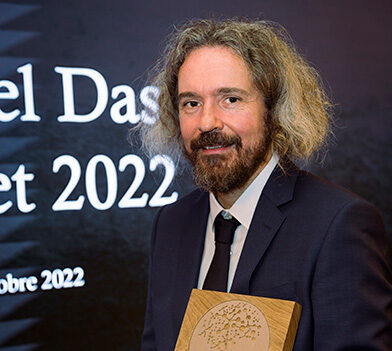Raoul Belzeaux, a smooth blend of two disciplines
Straddling the fields of psychiatry and molecular biology, Raoul Belzeaux, PUPH and psychiatrist at Montpellier University Hospital, is interested in biomarkers for mental disorders. The researcher has just received the Marcel Dassault Prize for his rapid testing project for bipolar disorders.

Straddling the fields of psychiatry and molecular biology, Raoul Belzeaux, PUPH and psychiatrist at Montpellier University Hospital, is interested in biomarkers for mental disorders. The researcher has just received the Marcel Dassault Prize for his rapid testing project for bipolar disorders.
Detecting bipolar disorder with a blood test. This is the test being developed by Raoul Belzeaux, a psychiatrist at Montpellier University Hospital, which earned him the Marcel Dassault Prize on October 13, 2022. If the test's effectiveness is confirmed by a clinical trial, it will help improve the management of this mental disorder, which is still poorly diagnosed. According to the French National Authority for Health, it currently takes an average of ten years between the first symptoms and medical diagnosis. "A general practitioner can easily diagnose depression in a patient, but it can be a symptom of different pathologies. However, the treatments for depression and bipolar disorder are different. Taking antidepressants can even aggravate the symptoms in a bipolar patient,"explains Raoul Belzeaux. The diagnosis is based on measuring the level of cytokines in the blood, an inflammatory biomarker that is specific to patients with bipolar disorder (BD). BD is a cyclical mood disorder with phases of depression and other manic phases.
Precision medicine
Raoul Belzeaux has been combining psychiatry and molecular markers since his medical studies. During his residency in psychiatry, he decided to pursue a master's degree in molecular biology. During his PhD, he focused on messenger RNA signatures in depressive episodes, in other words, how gene expression—measured through mRNA—varies during the diagnosis and treatment of depression. His findings, published in 2011, confirm in particular that the expected variation in the brain is also found in the blood. " Today, this is an accepted fact, but the discovery of this biomarker in the blood was important for medical practice because it facilitates diagnosis," the specialist points out.
Between 2015 and 2017, he joined Dr. Gustavo Turecki's team at McGill University in Montreal for a postdoctoral fellowship. Dr. Turecki is "a leader in epigenetic research on mood disorders and suicide," according to Dr. Bouchard. This was an opportunity to identify a new biomarker, the GPR56 receptor, involved in the regulation of depression. Riding the wave of precision medicine and early diagnosis, Raoul Belzeaux became a specialist in the identification of mood disorders through blood biomarkers. In 2011, the researcher joined the FondaMentale foundation, which is dedicated to the development of precision medicine in psychiatry.
600 patients over two years
For his latest research on TB, the challenge is therefore to find a biomarker that is easy to test. "Cytokines—proteins involved in communication between immune system cells and beyond—were a good candidate, as the tools to measure them are already widely available," explains the researcher. This hypothesis was validated and rewarded this year. But to confirm the test's value, it must still demonstrate its superiority over existing diagnostic tools. "The questionnaire currently used by general practitioners has a sensitivity of around 43%; the blood test will need to achieve an efficiency of over 75% to justify its industrial development," points out Raoul Belzeaux, who also acknowledges that cytokines are a sign of an inflammatory condition that can have multiple causes. The test can therefore only be used after a diagnosis of depression has been made by a doctor: it can then only be used to distinguish between depression and bipolar disorder. The researcher points out that a biomarker is a trace, an indication of the patient's condition. "Tests based on biomarkers should be seen as tools available to practitioners and not as a substitute for their work," insists the psychiatrist.
The €90,000 Dassault prize will contribute to the €550,000 budget needed to conduct the clinical trial on 600 patients over two years. Following this, if the test is validated, the long road to industrial development will begin, with plans to create a startup in partnership with SATT Sud-Est, a company responsible for transferring technologies from laboratories to industrial applications.
